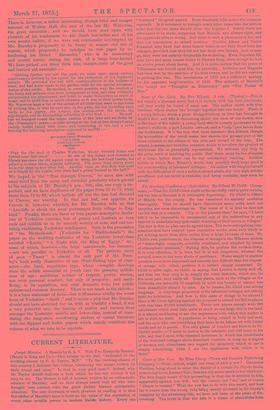The Sanitary Condition of aribrdshire. By Gilbert W. Child. (Long-
mans.)—that br: Child's book Ought td the carefully reatlis qidte certain, not thit less so because it is extremely depressing. Dr. Child is Officer of Health for the county. He has examined its sanitary condition thoroughly. That he should have discovered many evils used not surprise, nor even discourage us. The worst of. it is that he does not see his way to a remedy. "Up to the present time," he says, "I have felt it to be impossible to reeoramend any of the authorities in any district to undertake any systematic cleansing of their towns or villages.' The fact is that no plan can be agreed upon. The more enterprising com- munities that have entered upon expensive works seem very likely to get nothing more from their outlay than a large increase of rates. Dr. Child's own preference in the disposal of sewage is the Milanese system of "water-tight cesspools, carefully ventilated, and emptied by means of atmospheric pressure." Failing this, he prefers the surface drain. It is very offensive, it is true, but it is not dangerous, whereas the covered sewer is the very abode of pestilence. Water supply is another question even more important and scarcely less difficult than the dispose of sewage, with which problem it is indeed closely connected. Dr Child is quite right, we think, in saying that London is fairly well off, and that our first duty is to supply the rural districts, which are, for the most part, very badly off. Some places, such as the villages on the Chilterns, are naturally ill supplied, in most the bounty of nature has been shamefully abused by man. As to houses, Dr. Child uses strong language. A very large proportion of the labourers' cottages are utterly unfit for habitation. And how is this state of things to be altered ? Here is Mr. Cross fighting against the proposal to extend his Bill to places with less than 20,000 inhabitants. There are places enough with 200 inhabitants which want help quite as much as any large city in the land. It is almost maddening to see the supineness with which this matter is left to shift for itself. A population is being ruined in body and soul, and the men who owe everything they have to its labour sit with folded hands and let it perish. The only gleam of comfort one finds is in Dr. Child's words:—" I must in justice to the labourer, and still more to his wife, say that I meet with repeated instances in which the inhabitants of the wretched cottages above described contrive to keep up a degree of decency and cleanliness and regard for propriety which to me is simply astonishing, when I see the appliances with which it is done."


































 Previous page
Previous page